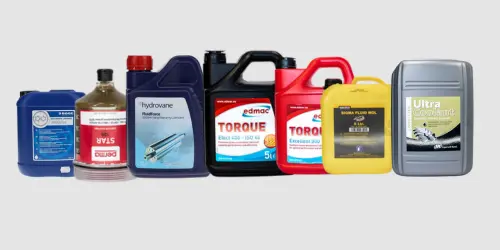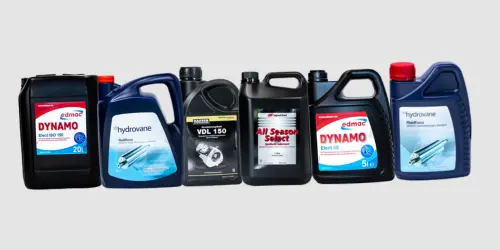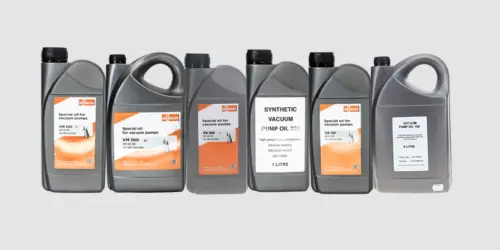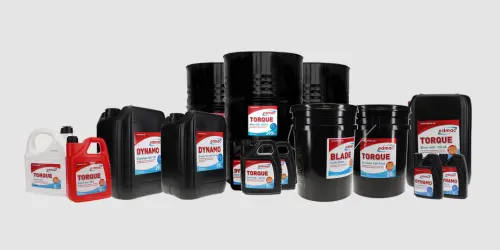Everything You Need to Know about Compressor Oils
Frequently Asked Questions
Choosing the right compressor oil is essential for maintaining performance, efficiency, and the long-term health of your equipment. Whether you're running a screw, piston, oil-free, or centrifugal compressor, this FAQ page answers the most common questions about oil types, change intervals, and best practices. Explore expert insights to keep your machines running smoothly and minimize downtime.
If you don't find what you are looking for, reach out to us on info@edmac.in.
🔧 Functions & Role of Compressor Oil
Compressor oil has several jobs:
- Lubrication to keep metal from touching metal
- Cooling by taking in heat while being compressed
- Sealing gaps between rotors to keep air from leaking
- Cleaning by trapping dirt and moisture for filtering
- Using the right oil makes sure that all four functions work well.
Yes, oil is very important for absorbing and releasing heat that is created when air is compressed, especially in oil-injected screw compressors. Choosing the correct oil keeps things cool and protects the inside parts from heat damage.
Yes. Compressor oil not only lubricates moving parts but also helps seal gaps between rotors or pistons, improving efficiency. It also reduces vibration and noise levels by creating a cushioning effect.
🛢️ Types of Compressor Oils & Lubricants
Not all compressor oils are created equal. The type of oil you need depends heavily on your compressor's design, operating conditions, and manufacturer specifications. Choosing the correct lubricant ensures optimal performance, extended equipment life, and lower total cost of ownership.
Compressor Types and Recommended Oils
1. Oil-Injected Screw Compressors
Recommended Oil:
- Synthetic PAO-based (Polyalphaolefin) compressor oils
- Hydrotreated mineral oils (for standard-duty applications)
Why: These compressors need oil to cool, seal, lubricate, and clean. Because the oil comes into close contact with compressed air, it needs to be clean and resistant to oxidation.
Top Properties to Look For:
- High thermal stability
- Anti-oxidation and anti-wear additives
- Good air release and low foaming
2. Oil-Free Screw Compressors
Recommended Oil:
- Synthetic ester-based oils or PAO-based bearing oils
Why: These machines just utilize oil to lubricate the bearings, not in the air end. The fuel ought to be able to last for a long time without getting dirty by air or water.
Top Properties:
- Excellent oxidative stability
- Compatibility with bearing materials
- Long drain intervals
3. Reciprocating (Piston) Compressors
Recommended Oil:
- Non-detergent mineral-based compressor oils
- Synthetic blends for heavy-duty or high-temperature use
Why: These systems don't mix air and oil. Oils should have strong films, minimal volatility, and the ability to regulate carbon deposits.
Top Properties:
- Low carbon-forming tendencies
- High flash point
- Detergency not needed (non-detergent oil preferred)
4. Centrifugal Compressors
Recommended Oil:
- ISO VG 32 or 46 turbine-grade mineral or synthetic oils
Why: Used for high-speed shaft bearings; oil doesn't get into the compression chamber. The main things to think about are cooling, lubrication, and resistance to oxidation.
Top Properties:
- Excellent demulsibility
- High oxidation stability
- Long service life under constant operation
Synthetic oils are less likely to oxidize, are less volatile, and last longer. Mineral oils are fine for regular use, but they break down faster when the temperature or load is high. Synthetic oils usually help you use less oil and save energy.
Depending on the temperature outside and the construction of the machine, most air compressors use oils with ISO VG 46 or 68 viscosity.
- ISO VG 46: Good for places with mild weather
- ISO VG 68: Works better in hot places
Always examine the OEM handbook to get the right viscosity grade for the way you use it.
Yes, food-grade compressor oils (usually NSF H1-certified) are made for food, drink, and pharmaceutical industries. These oils are safe to touch products by accident and meet high safety and hygiene standards.
No. Engine oils have detergents and other chemicals that are developed for combustion engines. These can make compressors froth, clog filters, and harm seals. Use oil that is made just for air compressors.
🛠️ Oil Maintenance & Change Intervals
Oil change intervals depend on oil type, compressor type, and operating conditions. Below is a general guide:
|
Compressor Type |
Oil Type |
Change Interval |
|
Oil-injected screw |
Mineral |
Every 2,000–4,000 hours |
|
Oil-injected screw |
Synthetic |
Every 6,000–8,000 hours |
|
Oil-free screw (bearings) |
Synthetic |
Every 8,000–10,000 hours |
|
Reciprocating |
Mineral or synthetic |
Every 500–1,000 hours |
|
Centrifugal |
Synthetic/mineral |
Every 8,000–16,000 hours or annually, whichever comes first |
🔁 Pro Tip: Always check the OEM handbook for the best advice. One of the main reasons compressors fail is because of bad oil.
When you need to change your oil:
- The oil looks dark, milky, or dirty
- The operating temperatures are higher
- The compressor's performance or pressure output is lower
- The service hours have gone beyond the acceptable limits
- The most accurate way to find out how good the oil is to get regular oil analysis.
Old or bad oil can cause:
- Parts to wear out faster
- Sludge and varnish to build up
- Not enough heat dissipation and overheating
- Bearing failure and system shutdown
To avoid costly problems and downtime, you need to replace your oil regularly.
Yes. Flushing the system while switching oil types (such from mineral to synthetic) keeps chemicals from reacting with each other and makes sure the oil works well. If you can, use a flushing agent that the manufacturer recommends.
- Look for oil contamination from dirt, coolant leaks, or fumes from the process.
- Change the oil filters and separator parts when you change the oil.
- Don't mix oil kinds; different chemistries can hurt seals and lower protection.
- Keep oil in a cool, dry place away from direct sunlight.
Excessive oil consumption may be due to:
- Wrong oil viscosity
- Worn-out seals or piston rings
- High operating temperatures
- Using oil that isn't good quality or isn't compatible
Making the switch to a premium synthetic oil with less volatility will drastically cut down on oil carryover.
Proper storage keeps oil fresh and stops it from going bad before usage.
- Keep containers closed and upright.
- Store in a cool, dry place away from direct sunlight
- Don't let moisture or contaminants get in.




